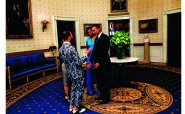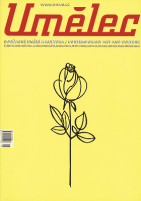|
A friend of mine, a developer, decided to do something for the arts. He chose to enforce this enlightened mission because there is simply no other way to do it in a society lacking a sufficiently large enough group of snobs, where even state representatives place their bookshelves out on the balcony. This developer will buy a huge piece of land, about 1,230 acres, and build 5,000 family homes, a very sought after commodity in post-Communist countries with generations of people suffering from concrete block-of-flat trauma. The family homes will be no cheaply constructed monsters; they will be modern, efficient, simple and affordable. However there will be a couple of conditions before buying the house: the buyer will have to acquire a painting by a contemporary artist (included in the price of the house). Condition number two: the painting will have to be hung in the house for a period of at least one year, and the inhabitants will have to learn to live with it. The buyer will be allowed to pick the painting from a catalogue. The developer believes that the inhabitants will, in the end, grow attached to the work of art, and they won’t take it down after twelve months. They won’t be able to return it. This forced, enlightened rationing may, however, result in the completely opposite effect. After a year of frequently unannounced visits by the developer’s employees, the resident will be happy to toss the painting, closing the circle and we’re back at the balcony. Mission Impossible.
Recommended articles

|
|
Goff & Rosenthal gallery, Berlin, November 18 - December 30, 2006
Society permanently renegotiates the definition of drugs and our relationship towards them. In his forty-five minute found-footage film The Conquest of Happiness, produced in 2005, Oliver Pietsch, a Berlin-based video artist, demonstrates which drugs society can accommodate, which it cannot, and how the story of the drugs can be…
|

|
|
The editors of Umělec have decided to come up with a list of ten artists who, in our opinion, were of crucial importance for the Czech art scene in the 1990s. After long debate and the setting of criteria, we arrived at a list of names we consider significant for the local context, for the presentation of Czech art outside the country and especially for the future of art. Our criteria did not…
|

|
|
An American poet was invited to the White House in order to read his controversial plagiarized poetry. All tricked out and ready to do it his way, he comes to the “scandalous” realization that nothing bothers anyone anymore, and instead of banging your head against the wall it is better to build you own walls or at least little fences.
|

|
|
Contents of the new issue.
|
|





Comments
There are currently no comments.Add new comment